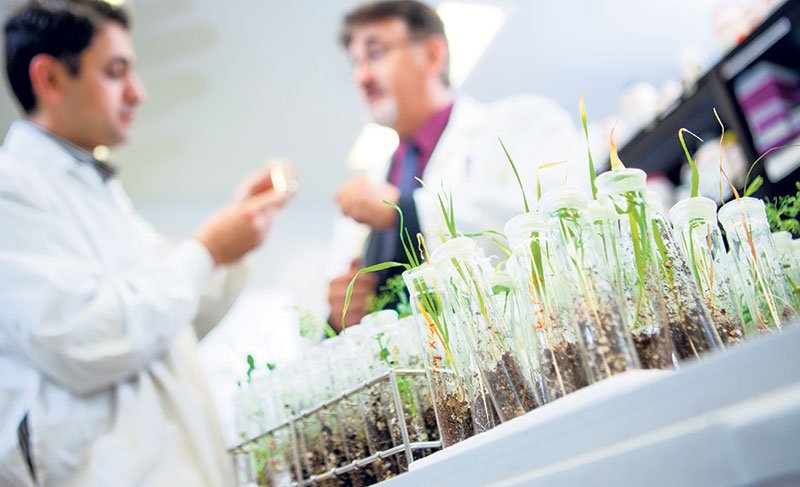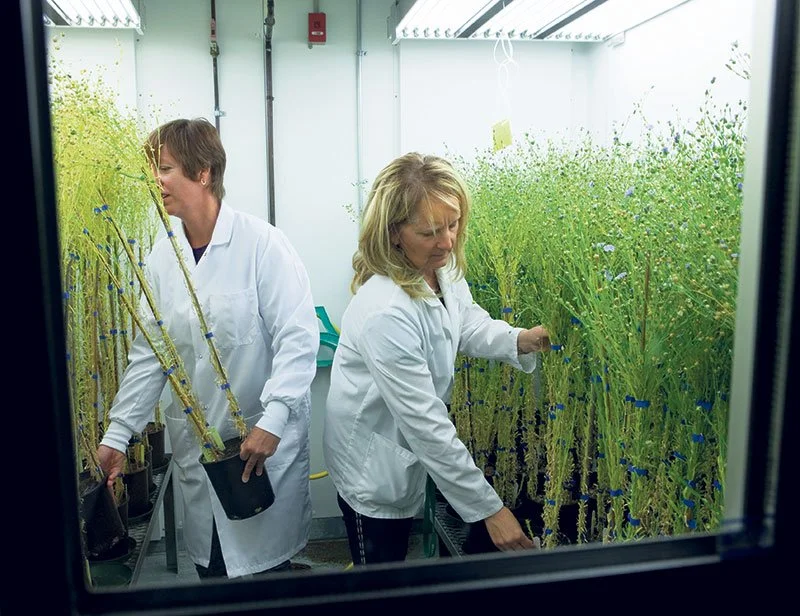Building climate resilience and food security
Researchers at the University of Saskatchewan are looking at plant physiology, for example, to improve plant root systems so they can reach deeper into the ground to access ground water, better sequester carbon in the soil, and use fertilizers more efficiently. supplied
There are many mysteries about humanity, but we know at least one thing is true: people need food and water to survive. Canada is a land of tremendous bounty, especially when it comes to our food supply. With so much growing land and places to raise livestock, the agricultural possibilities, in the southern part of the country at least, have traditionally felt seemingly endless. But climate change is throwing a wrench into agricultural practices around the world, with drought, flooding and disease threatening the security of our food systems. With consistently ballooning populations and unstable growing conditions, the future of food security is a pressing concern for academics and the general population alike.
“Food insecurity is an extremely serious problem. If we don’t up the ante as the population grows towards 10 billion, there won’t be enough food to feed everyone at the current rates of yield increase. ”
Thankfully, for both Canadians and people around the world, the topic of safe and sustainable agriculture is one of the key fields of research at the University of Saskatchewan (USask). The university facilitates a variety of disciplines coming together in programs and centres dedicated to researching agricultural resilience and food security. USask is home to the Crop Development Centre, the Global Institute for Food Security, the Global Institute for Water Security, the Livestock and Forage Centre of Excellence, and other programs, all working together, often with other departments and colleges within and beyond the university to tackle the issue of making sure that humankind has enough to eat in an uncertain future.
“Food insecurity is an extremely serious problem,” says Dr. Leon Kochian, Canada Excellence Research Chair in Global Food Security and program lead at the Global Institute for Food Security at USask. “If we don’t up the ante as the population grows towards 10 billion, there won’t be enough food to feed everyone at the current rates of yield increase. Then there are the issues of climate change extremes and having to develop crops that can deal with flooding as well as drought and higher temperatures. Growing enough food is one issue, but we also have to ensure we’re growing it responsibly and sustainably.”
Dr. Kochian’s research specialty is in the field of molecular biology and physiology, especially as it pertains to the part of the crops that are underground. He and his colleagues work on things like improving plant root systems so roots can reach deeper into the ground to access ground water, better sequester carbon in the soil, and use nitrogen and phosphorus fertilizers more efficiently, all of which will not only make for crops that can survive extreme weather patterns but can also help mitigate climate change by using crop inputs more efficiently, increasing high-quality yield with reduced environmental impact. It’s an example of the high-level scientific work going on at USask, but it’s far from the only tool that the university’s researchers have when it comes to addressing food security.
Dr. Angela Bedard-Haughn, dean of the College of Agriculture and Bioresources, says that USask is uniquely positioned to be a leader in food security. Her college has a long history of studying the benefits of no-tilling methods, breeding resilient crops and addressing soil health, all of which pertain to the effects of more modern crises. While the acceleration of extreme conditions created by climate change are a more recent threat to agriculture, famine and drought have always been pressing concerns for farmers and a focus of USask’s agricultural researchers.
“The College of Agriculture and Bioresources is one of the original colleges at University of Saskatchewan, so one could argue that we’ve been doing food security work for 110 years,” Dr. Bedard-Haughn says. “We have been dealing with climate volatility since there has been agriculture on the prairies. It’s not a particularly hospitable environment, and multi-year droughts have never been unheard of. Through those learnings, we have ended up with many of our current practices.”
Both Dr. Kochian and Dr. Bedard-Haughn say that it’s immensely important that this research is being conducted right in the heart of Saskatchewan, a place that makes up 44 per cent of Canada’s farmland and is a world leader in grain, canola oil and pulse exports, sending billions of dollars of each of its key crops around the world every year. This creates a unique synergy, giving researchers direct access to farmers and ranchers to collect data as well as address real-world problems in a cooperative and collaborative way. Dr. Bedard-Haughn says that collaborating with farmers on the ground helps researchers come up with responses to events like Saskatchewan’s 2021 record-breaking drought. This knowledge gained from working directly with producers can be extended to other at-risk regions like Africa or Canada’s Arctic.
“It’s really important that this research is happening in Saskatchewan specifically, because we really are a province that’s feeding the world,” Dr. Bedard-Haughn says. “It’s a key responsibility that we take very seriously. When we think about food security, we need to be thinking in terms of where that food is coming from and at what scale so that we can protect that food source.”
Advancing the understanding of plants at the University of Saskatchewan can help to create more resilient crops. supplied
With so much concerning news about climate change coming in at such a rapid pace, the fight for food security can feel insurmountable, but the researchers at USask are creating reason for cautious optimism in regards to both farmers’ economic futures and the planet’s ability to produce enough food. Dr. Kochian and his colleagues are making gains in breeding plants with more efficient root systems, while other academics are doing things like using canola byproducts as animal feed, studying transportation issues to combat food waste, and using new technology to farm smarter and more efficiently under difficult weather conditions. It will take a lot of hard work and a multi-pronged, multi-disciplinary approach, but the research teams at USask are doing their part to make sure we humans continue to find ways to feed ourselves.
“I’m pretty confident that things are going to be okay. I’ve seen amazing changes in my 40 years in this field, and the research is accelerating,” Dr. Kochian says. “I do think we’ll be able to solve these problems.”
To view this report on The Globe's website, visit globeandmail.com
To view the full report as it appeared in The Globe's print edition: Next-generation farming



